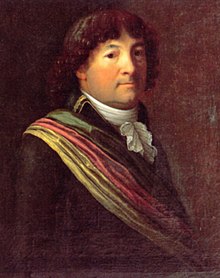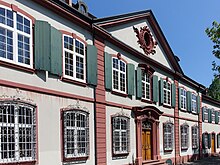Peter Ochs
Peter Ochs (born August 20, 1752 in Nantes , † June 19, 1821 in Basel ) was a Swiss politician , lawyer , historian and writer .
life and work
Peter Ochs was born on August 20, 1752 in Nantes, France, to Albert Ochs, a well-known wholesale merchant from Basel, and Louise His.
After completing a commercial apprenticeship with his grandfather and father in Hamburg , Ochs studied law in Basel and Leiden . In 1776 he finished his studies with a doctorate as Dr. iur. In 1779 Ochs married Salome Vischer. In 1782 he was appointed councilor in Basel as the successor to the enlightener Isaak Iselin . In 1787 he was appointed the first governor of the newly founded Basel Reading Society . In 1790 he became town clerk and then stayed several times as Basel's envoy in Paris . In 1795 he acted as a mediator in the negotiations on the peace of Basel between Prussia and France. In 1796 he was appointed chief guild master.
As a liberal and dedicated representative of the Enlightenment , Peter Ochs was commissioned by the French Directory in December 1797 to draft a new constitution for Switzerland. His draft for a Helvetic Republic envisaged converting the old confederation based on the French model from a loose confederation of states into a modern central state, with the cantons being degraded to administrative units. After French troops had occupied federal territories in the spring of 1798, Peter Ochs proclaimed the Helvetic Republic on April 12, 1798 from the balcony of the Aarau town hall. As a " sister republic" it was closely tied to the French republic.
His political opponents attacked Ochs harshly and titled his draft constitution, which laid the basis for the new constitution, as "Ox-Box". This hostility meant that Ochs was passed over to the Helvetic Directory in the elections and was only able to join the Helvetic government in the summer of 1798 under pressure from the French.
In 1799 he was ousted from office by Frédéric-César de la Harpe . After Napoleon's enactment of the mediation constitution in 1803, he was able to resume political activities in the canton of Basel. Even in the restoration period after the final fall of Napoleon in 1815, he remained an important exponent of the political life of his hometown and was particularly involved in education. In conservative circles, however, he remained so ostracized that his sons adopted the name His in 1818, while their father was still alive.
From 1780 to 1800 Peter Ochs was the owner of the Holsteinerhof at Hebelstrasse 32 in Basel.
Peter Ochs also wrote dramas and opera libretti, which, however, remained unsuccessful, and he is the author of an eight-volume “History of the City and Landscape of Basel”, published between 1786 and 1822, which lasted for over 50 years, and for certain epochs even longer, the standard work remained and is still occasionally consulted today.
In the estate of Peter Ochs there was a list of books from his own library. It comprised 632 numbers with over 1500 volumes.
Honors
In 1922, a new street in the Bruderholz district of the city of Basel was given the name Peter-Ochs-Strasse .
In 1989, on the initiative of Markus Kutter, a Peter Ochs Society was founded, which dealt with the life and person of Peter Ochs until it was dissolved. In 1992 an extensive biography was published.
literature
chronologically
- Dietrich Seybold: Peter Ochs . In: Andreas Kotte (Ed.): Theater Lexikon der Schweiz . Volume 2, Chronos, Zurich 2005, ISBN 3-0340-0715-9 , p. 1338.
- Edgar Bonjour : Ochs, Peter. In: New German Biography (NDB). Volume 19, Duncker & Humblot, Berlin 1999, ISBN 3-428-00200-8 , pp. 140 f. ( Digitized version ).
- Beat von Wartburg: Muses & Human Rights: Peter Ochs and his literary works . Christoph Merian Verlag, Basel 1997, ISBN 3-85616-088-4 (dissertation University of Basel 1997, 655 pages).
- Markus Kutter : About the difficulty in restoring the Peter Ochs picture . In: Basler Zeitschrift für Geschichte und Altertumskunde , Vol. 92, 1992, pp. 119-137. ( Digitized version ).
- Peter F. Kopp: Peter Ochs. His life told based on personal testimony and richly illustrated with authentic pictures . Buchverlag Basler Zeitung , Basel 1992, ISBN 3-85815-248-X .
- Max Bächlin: 1791: Town clerk Peter Ochs' mission in Paris. Smuggling as a Human Right. The efforts of the town clerk Peter Ochs to improve the Swiss-French trade relations during his stay in Paris in 1791. In: Basler Stadtbuch 1991 , pp. 54–57.
- Beat von Wartburg: 1791: Town clerk Peter Ochs' mission in Paris. Preferably back to Basel in a balloon. In: Basler Stadtbuch 1991 , pp. 49–53.
- Gustav Steiner: The origin of the Basel statesman Peter Ochs. In: Basler Stadtbuch 1960 , pp. 11–57.
- Andreas Staehelin : Peter Ochs as historian (= Basel contributions to historical studies ; Volume 43). Helbing & Lichtenhahn, Basel 1952, DNB 454817517 (Dissertation University of Basel, Faculty of Philosophy and History, [1952], 276 pages).
- E. Schlumberger-Vischer: Peter Ochs. Observation sur la Suisse . In: Basler Zeitschrift für Geschichte und Altertumskunde , Vol. 20, 1922, pp. 360–367. ( Digitized version ).
- Rudolf Luginbühl : Peter Ochs and Basel in the years 1801/02. In: Basler Zeitschrift für Geschichte und Altertumskunde , Vol. 4, 1905, pp. 277–286. ( Digitized version ).
- Gustav Tobler: Some letters from Peter Ochs from 1799 . In: Basler Zeitschrift für Geschichte und Altertumskunde , Vol. 1, 1902, pp. 261–269. ( Digitized version ).
- Albert Gessler: Peter Ochs as a playwright. In: Basler Jahrbuch 1894 , pp. 106–186.
- Martin Birmann : Ochs, Peter . In: Allgemeine Deutsche Biographie (ADB). Volume 24, Duncker & Humblot, Leipzig 1887, pp. 131-144.
- Ochs, (Peter) , in: Markus Lutz: Modern Biographies , or short news about the life and work of interesting men of our time, who have distinguished themselves as regents, generals, state officials, scholars and artists in Switzerland. Kappler, bey Lichtensteig 1826, p. 245 ff., Digitized
- Niklaus von Brunn: funeral speech at the funeral of Mr. Peter Ochs , Schweighauser Buchdruckerey, Basel [1821], digitized
Individual evidence
- ↑ Gustav Steiner: Peter Ochs. A book collection from the 18th century. Retrieved May 17, 2020 .
Web links
- Literature by and about Peter Ochs in the catalog of the German National Library
- Peter Och's estate in the Basel University Library
- Peter Ochs in the person lexicon of the canton of Basel-Landschaft
- Peter F. Kopp: Ochs, Peter. In: Historical Lexicon of Switzerland .
| personal data | |
|---|---|
| SURNAME | Ochs, Peter |
| BRIEF DESCRIPTION | Swiss politician |
| DATE OF BIRTH | August 20, 1752 |
| PLACE OF BIRTH | Nantes |
| DATE OF DEATH | June 19, 1821 |
| Place of death | Basel |

